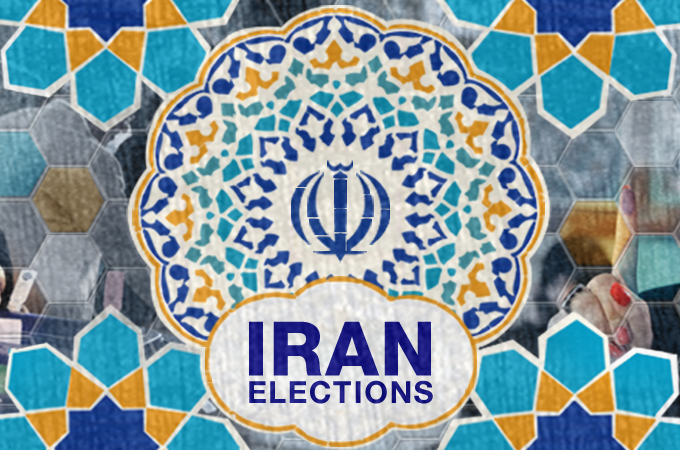Interior Ministry figures show moderate cleric with lead just over 50 percent in presidential election. |
|
Moderate cleric Hassan Rouhani has taken a clear lead
in Iran's presidential election based on the latest results, with about
two-thirds of the total votes counted, according to the interior
ministry and the AFP news agency. Rouhani, a former nuclear negotiator, leads with 11,754,013 votes of the 23,014,873 ballots to have been counted by 1100 GMT, 51 percent of counted votes. The Interior Ministry said that Rouhani is followed by Tehran mayor Mohammad Baqer Qalibaf with 3,494,938 votes. Mohsen Rezaei, a former head of the elite Revolutionary Guard, is in third place with 2,723,202 votes, racing past Saeed Jalili, Iran's chief nuclear negotiator, who has 2,593,16 votes. Trailing the field were former Foreign Minister Ali Akbar Velayati with 1,405,543 votes, and little-known former minister Mohammad Gharazi with 276,599 votes. Earlier, Interior Minister Mostafa Mohammad Najjar told state television on Saturday that his electoral staff would not "compromise accuracy for speed". Iran's state-owned news network Press TV said that voter turnout in the presidential election has been around 80 percent. That is about 40 million votes out of a possible maximum of 50 million. Polling stations stayed open for up to five hours later than planned as millions of Iranians turned out to cast their votes. An announcement of initial results by the Interior Ministry, scheduled for around 1:30am local time, was then postponed by several hours. In an apparent attempt to signal political continuity, Ayatollah Ali Khamenei said on Saturday that whatever the result of Friday's election, it would be a vote of confidence in the 34-year-old republic. "A vote for any of these candidates is a vote for the Islamic Republic and a vote of confidence in the system," the clerical leader's official Twitter account said. Rouhani analysis Al Jazeera's Soraya Lennie, reporting from Tehran, said there has been no reaction from any of the candidates' camps as it is too early to comment on the figures. Speaking about Rouhani, she said that his policies do stand out from the other candidates. Lennie added that Rouhani, who is a relatively moderate candidate compared to the others running, had talked about equal rights and equal pay for women, releasing political prisoners, lifting sanctions and said that the government should not interfere in people's private lives. Hooman Majd, an Iranian-American journalist, told Al Jazeera the high turnout rate could be that people in Iran believe there is going to be change as there is a lot of excitement that Rouhani could win. He said while the Western media narrative has been that Rouhani is far to the left, there is going to be a certain relief for those who want to see a negotiated settlement on the nuclear programme. Trita Parsi, president of the National Iranian American Council, told Al Jazeera about some possible scenarios if Rouhani is elected president of Iran. "If this result stands, the Western narrative stating that Ayatollah Ali Khamenei and the IRGC [Guardian Council] are all-powerful needs to be revisited," Parsi, author of A Single Roll of the Dice: Obama's Diplomacy with Iran, said in an email to Al Jazeera. Appeal for calm Before the polls closed, all six of the presidential candidates issued a joint appeal for calm. "We ask people not to pay attention to rumours of victory parades being organised and to avoid gathering before the official results" are announced by the interior ministry, their statement said. Polling hours had been extended a further hour in the capital, Tehran, in the face of what officials reported was a turnout almost as large, or bigger, than that for the controversial re-election of Mahmoud Ahmadinejad four years ago. In 2009, turnout reached 85 percent nationwide. More than 50.5 million Iranians were eligible to vote for the man to succeed Ahmadinejad, who is constitutionally barred from standing for a third term. The full results are expected on Saturday, but if no candidate secures more than half of the votes for an outright victory, the top two will square off in a second-round run-off on June 21. The campaign has been dominated by Iran's controversial nuclear programme and an economy devastated by harsh EU and US sanctions imposed in an attempt to rein it in. Inflation is raging at more than 30 percent, the rial has lost nearly 70 percent of its value and unemployment is rising. Western governments and Israel accuse Iran of seeking to develop atomic weapons under cover of its civil nuclear programme, a charge it denies. |
Saturday, 15 June 2013
Latest results put Rouhani ahead in Iran poll
Subscribe to:
Post Comments (Atom)


No comments:
Post a Comment